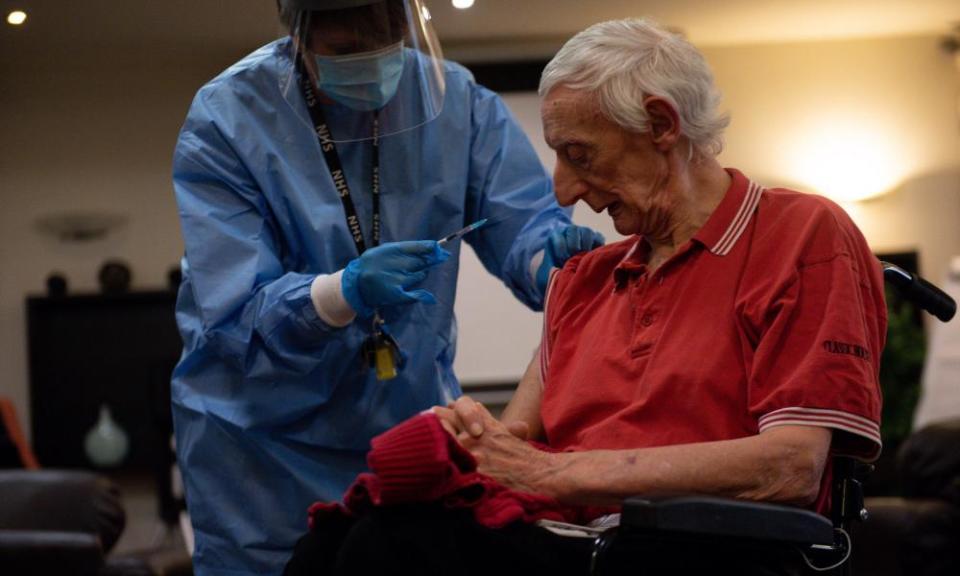As many as six in 10 UK care home residents still awaiting Covid jab

Wide disparities have emerged in the campaign to protect care home residents from Covid-19, with 100% getting their first jab in Slough, while nearly six in 10 are still awaiting vaccinations in one of the UK’s the largest care home chains.
In what the vaccines minister described as a “race against deaths”, care bosses reported struggles to protect the oldest and most vulnerable members of society.
Care UK said on Monday that 43% of its 6,500 residents had received a coronavirus vaccine. Barchester, which looks after 12,000 people, said 57% of its residents had been immunised – suggesting that without acceleration it would take until the end of the month to cover everyone with at least one dose.
NHS England had given GPs until 24 January “at the latest” to complete the first round of vaccines, including care home staff. That ambitious target now looks likely to be missed. Seventy per cent of Care UK’s staff and 57% of Barchester’s workers have yet to be vaccinated, they said.
Matt Hancock, the health and social care secretary, said on Monday that half of elderly care home residents across England had received a first dose including all those in Slough, Berkshire.
Nadhim Zahawi, the vaccines minister, said on Monday the vaccination programme was a “race against deaths”. The urgency of delivery to care homes was illustrated by the case of Northbrooke House in the Isle of Wight which was scheduled to receive jabs just before Christmas but faced delays. After one person tested positive on 28 December, 30 residents and 38 staff tested positive in the first week of January.
Maggie Bennett, the managing director of Island Healthcare, which runs Northbrooke, said recent weeks had been “horrendous”. The outbreak has resulted in the home’s manager, Kat Cotton, regularly working 18-hour days from 3am to as late as 10pm to make up for acute staff shortages. Cotton said it was unclear whether vaccination as originally planned would offer protection because of the time it took recipients to develop immunity.
Related: NHS orders rapid acceleration of care home Covid vaccinations
“What was promised to us at the beginning was the Pfizer vaccine, which is difficult to store and distribute,” said Bennett. “It wasn’t the most ideal type of vaccine to bring into the care home and that was the difficulty the GP surgeries were having. It wasn’t a lack of motivation, rather … the practicalities of getting it out. It is sad that the consequence of not having it could have been that a lot of our residents succumbed to it when they might not have done.”
Asked about patchy delivery of the vaccine, Hancock said: “We’re putting more supply into areas that have got more to do. Supply is the rate limiting factor.” He said the over-70s would now start to receive the vaccine as well as those with clinical vulnerabilities under 70.
Residents in care homes for older adults and their carers were named last month by the Joint Committee on Vaccination and Immunisation as the top priority followed by all over-80s and frontline health and social care workers.
GPs and care operators said the difficulty of delivering the Pfizer/BioNTech vaccine, which needs to be kept at low temperatures, was one problem, while patchy supplies of doses and limitations on the number of medical staff available to go into homes were other limiting factors.
The target of completing all jabs in elderly care homes by Sunday was set by the NHS medical director for primary care last week amid concern about rising Covid outbreaks in care homes. In the week to 10 January there were 692 Covid incidents in care homes in England – almost treble the 236 in the week to 20 December.
The Department of Health and Social Care said the government’s target was to complete the programme by the end of this month. Stephen Powis, the national medical director for England, said the NHS was going as fast as it could across the country.
The Orders of St John Trust, which looks after arbout 3,000 people, said half its residents have received the jab while MHA, the UK’s largest not-for-profit operator of care homes, said that while 11 of its homes had not heard from the NHS yet about vaccinations, about two-thirds of its homes had received vaccines.
Hancock urged those over 80 who had not been vaccinated to be patient, promising they would get their jabs within four weeks. He said it took time to set up each approved vaccination site and said he wanted care home residents to be vaccinated quicker than the 15 February deadline for the four highest priority groups.
An NHS spokesperson said: “Vaccinating care home residents is a priority for local GP-led vaccinating teams, with the goal of doing so by the end of this month. Just a fortnight after the Oxford vaccine – which allows teams to more easily vaccinate in care homes - over half of all care home residents have already received their jab, up from a quarter the week before.”

 Yahoo Finance
Yahoo Finance 